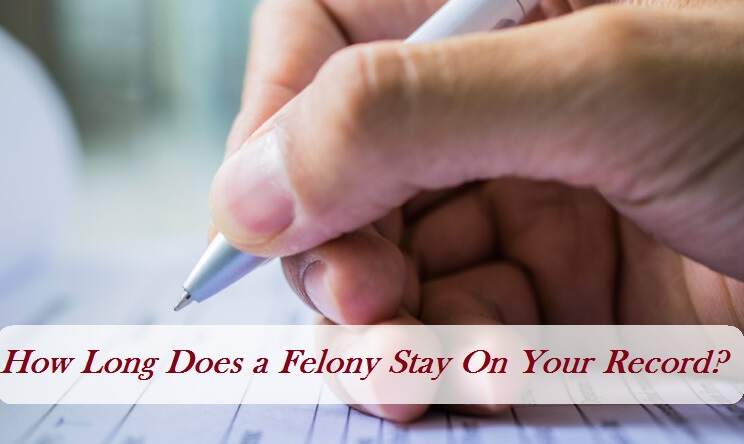How Long Does A Felony Stay On Your Record? Have you been convicted of a felony? Your life is going to change forever. Unfortunately, many of these changes will not be good for you. A felony conviction can turn your life upside, ruin your relationships, and make it difficult for you to obtain suitable employment.
Nevertheless, you should know that a felony conviction is not going to ruin your life. It shouldn’t haunt you for eternity. It will likely always be there but you don’t need to let it hold you back. Below, you’ll learn more about felony convictions and the amount of time they stay on criminal records.
It Never Leaves
Many people believe that a felony conviction is going to leave a criminal record in 7 years. Unfortunately, this is not the case. In most cases, a felony conviction will follow the felon for the rest of their life. It may not show up during pre-employment background checks, but the felony will likely remain on your record.
Nevertheless, there is one technique that can help you remove the felon from your criminal history. The expungement process isn’t simple but it can help.
Regardless, you have to remember that a felony conviction is going to remain on your criminal record for eternity. It will never go away unless you get it removed.
Sealing A Felony Record

As mentioned above, a felony conviction is never going to leave. If you want it to disappear, you’ll need to take steps to have it removed. A felony conviction is going to remain on your record for the rest of your life unless you get it removed.
Felony convictions aren’t going to automatically disappear. Asking a judge to seal the records is the best way to resolve the problem. In some states, you’ll be able to expunge the record. If you do this, you can eliminate the conviction entirely. However, this isn’t an option in New York.
If you want to remove a felony conviction in New York, you’ll have to get the records sealed. Although it is similar to expungement, it is slightly different. After you’ve managed to get the conviction sealed, nobody will be able to find out about it.
You can hide the sealed conviction from landlords, employers, and others. The files will remain but most people won’t be able to find them. Just remember that some people can find the felony record in some circumstances.
Who Can Access Sealed Felons?
Even if you get a felony conviction sealed, it will be accessible. Sealed records can be accessed by certain individuals, including people you designate. If you want someone to have access to your record, they can get it. If you’re applying for a job that requires you to carry a firearm, the employer will be able to find the sealed felony conviction.
In some cases, parole officers will be able to find this information as well. In some cases, a court may order it. If this happens, prosecutors and law enforcement may be able to access the sealed conviction.
Sealing A Felony Record After 10 Years
Current law in New York states that many felony convictions can be sealed after 10 years. You’ll have to wait 10 years after your sentencing or release before you can get the record sealed. You’ll also need to make sure that other conditions are met.
For instance, you cannot get a record sealed when you have criminal charges pending against you. You cannot have recent criminal convictions either. You can only get a felony conviction sealed in New York if you have two convictions or less. Finally, you can only have a certain number of convictions sealed.
Since the process is complicated, it is often best to work with an attorney. Be sure to talk to an attorney so they can talk you through the process.
Some Felonies Can’t Be Sealed
You have to remember that certain felony convictions cannot be sealed. In New York, felons can have their records sealed. However, it depends on the type of crime you committed. Certain convictions cannot be sealed. In most cases, this includes convictions that could put the public in danger.
For instance, you can’t get many sexual offenses sealed. Any crime that fits into the violent category likely cannot be sealed. Class A or serious felonies can never be sealed.
Many dangerous felonies cannot be sealed. Are you curious to know whether your conviction can be sealed? If so, you should talk to an experienced attorney. Doing so is the best way to find out. Furthermore, the laws can vary from one state to another. Be sure to check the specific laws in your area to find out what you’re up against.
Can Felonies Be Expunged?
Besides sealing a criminal conviction, you might be able to get it expunged. However, it is vital to understand that the process is going to be significantly harder. It is easier to get a misdemeanor expunged.
Another thing to note is that felonies cannot be expunged in certain states. If you live in Iowa, Arizona, Nebraska, Texas, or Montana, you don’t be able to expunge your felony conviction. In other states, the felons that can be expunged are slim. These states include California, Colorado, and Wisconsin.
Most felonies are eligible for expungement in Oregon, Washington, Nevada, and Utah. Expungement is similar to sealing a criminal conviction. In many cases, the conviction cannot be sealed. It depends on the offense that you committed.
For instance, you won’t be able to expunge a conviction of murder, rape, arson, terrorism, or capital offenses. If the crime could lead to a life sentence, the conviction cannot be expunged.
What does Expungement Do?
You’ll want to do what you can to hide your felony conviction. Doing so will make a big difference in the long run. Once it has been expunged, you’ll be more likely to get a good job. When you get the conviction expunged, it should be hidden from public view.
Many believe it will destroy the records but it will not. Instead, it seals the record so people cannot find it. Nevertheless, it is important to understand that certain employers and government agencies will be able to access the records. In some states, expunged records can still be accessed.
Sealing and expungement are often the same since they achieve the same thing.
What Is Required To Expunge A Felon?
Before you can expunge a felony conviction, you have to make sure that you meet all requirements. For instance, you might be required to wait a specific period. In some areas, you have to wait 10 years before you can try expunging the record.
You’ll also need to maintain a clean record. If you’ve been arrested within the past few months, you won’t be able to expunge your 10-year-old felony conviction. You’ll also have to pay any fees associated with the conviction. You need to pay court fees and restitution.
Finally, you’ll have to complete the expungement procedure. It isn’t easy. It is wise to team up with an attorney because they’ll make it easier.
Summary
A felony conviction is going to remain on your record for life. It won’t disappear unless you take steps to remove it. However, you have to remember that this isn’t possible in some areas. It is vital to learn more about the laws in your area. You might be able to get the conviction removed, but you might not.
Sealing or expunging the felony conviction is wise. Make sure you can do this before hiring an attorney to walk you through the process.
FAQs on How Long Does A Felony Stay On Your Record?
Do Felonies Go Away After 7 Years?
Felony convictions typically remain on criminal records for eternity. However, it is important to remember that most pre-employment criminal history searches only cover seven years.
Although employers can look for felony convictions from 8 or more years ago, most only look at the last seven years. Regardless, the felony conviction is not going to disappear from your criminal record unless you get it expunged.
What about winning games? You might be interested to know if felons can win the lottery.
Do Felonies Show Up On Background Checks?
Remember that felony convictions tend to be worse than misdemeanor convictions. Therefore, you can guarantee that employers want to know about your felony convictions. They will show up on your background check.
Many employers only good back seven years but you can’t be positive. Either way, felonies will show up on background checks.
Read Also: How Long Does A Misdemeanor Stay On Your Record?
Will A 20-Year-Old Felony Show Up On A Background Check?
You’re likely under the impression that an old felon will not show up on your background check. Ultimately, it depends on the employer and the job you’re getting.
Employers usually have the ability to search as far back as they want for felony convictions. Therefore, it could show up on your criminal record. The only way to be positive that it won’t is by having the conviction expunged.
Does Being A Convicted Felon Stay With You For Life?
Unfortunately, a felony conviction is likely going to stay with you for the rest of your life. Unless you get it removed or expunged, it will stay with you.
Recommended: Seven Year Background Check States


I have two misdemeanors and two felonies over 10 years ago and now I’m moving to Florida will they show up if the association does a background check